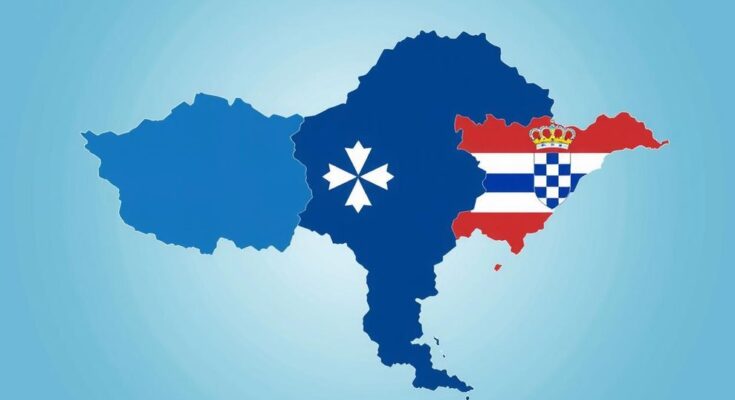The trilateral military alliance between Kosovo, Albania, and Croatia has created controversy surrounding its potential impact on regional stability, particularly with Serbia. While the pact emphasizes security cooperation, critics argue it exacerbates political tensions and could complicate diplomatic endeavors. The reactions from involved countries vary, highlighting intricate geopolitical dynamics in the Balkans.
A newly ratified trilateral military alliance between Kosovo, Albania, and Croatia has caused significant controversy in the Western Balkans, raising substantial concerns regarding its potential consequences for regional stability and diplomatic relations. While the involved nations present the agreement as a means of bolstering security cooperation and fostering regional peace, critics argue that it may intensify political rifts and escalate tensions with neighboring states, particularly Serbia, while complicating ongoing efforts for long-term reconciliation in the Balkans.
The alliance encompasses aspects of military collaboration, including joint training, cybersecurity coordination, rapid response protocols, and defense procurement. However, many analysts view the pact not merely as technical cooperation, but as a significant political declaration, particularly due to Kosovo’s central role. Kosovo, having declared independence from Serbia in 2008 and lacking recognition from Belgrade and several UN member states, is perceived as engaging in a provocative geopolitical strategy by formalizing a military alliance with two NATO members.
Dr. Marko Ivković, a security analyst in Belgrade, stated, “This alliance is not just about defence—it’s about redefining the regional balance of power.” He emphasized that the alliance suggests Kosovo’s growing status as a de facto NATO partner, despite its lack of formal recognition. This perspective has prompted strong condemnation from Serbian officials, who describe the agreement as a threat to peace and a hindrance to the EU-facilitated dialogue between Serbia and Kosovo. President Aleksandar Vučić characterized the pact as “a dangerous escalation,” warning of the potential for a regional arms race.
In a televised address, President Vučić remarked, “This agreement does not contribute to peace—it isolates Serbia and fuels division.” Meanwhile, pro-government media in Serbia speculate that the pact may indicate a trajectory toward deeper military integration between Albania and Kosovo, thereby amplifying fears of a supposed “Greater Albania” ideology that has long persisted in Balkan nationalist rhetoric, notwithstanding denials from both Tirana and Pristina.
Concerns regarding the alliance have also been echoed by some EU diplomats, who fear that the trilateral military pact might hinder Serbia’s EU accession process and reignite nationalist sentiments in the region. A Brussels-based EU official warned, “This type of military coordination needs to be carefully managed. Otherwise, it risks becoming another flashpoint in an already delicate geopolitical theatre.”
Responses within the three participating nations have varied. In Albania and Kosovo, the alliance has been largely received positively, viewed as a significant step towards regional integration and security assurance. Conversely, in Croatia, particular political factions have expressed skepticism regarding the merits of deeper military connections with Kosovo, citing legal uncertainties and the potential repercussions on relations with Serbia, an important trading partner.
The newly established military alliance among Kosovo, Albania, and Croatia has sparked significant controversy, with implications for regional stability and relations, particularly with Serbia. While proponents hail it as a necessary step for security cooperation, critics warn of exacerbated tensions and the risk of hindering diplomatic efforts in the Balkans. The mixed reactions within the signatory countries underline the complexity of the geopolitical landscape in Southeast Europe.
Original Source: globalsouthworld.com




